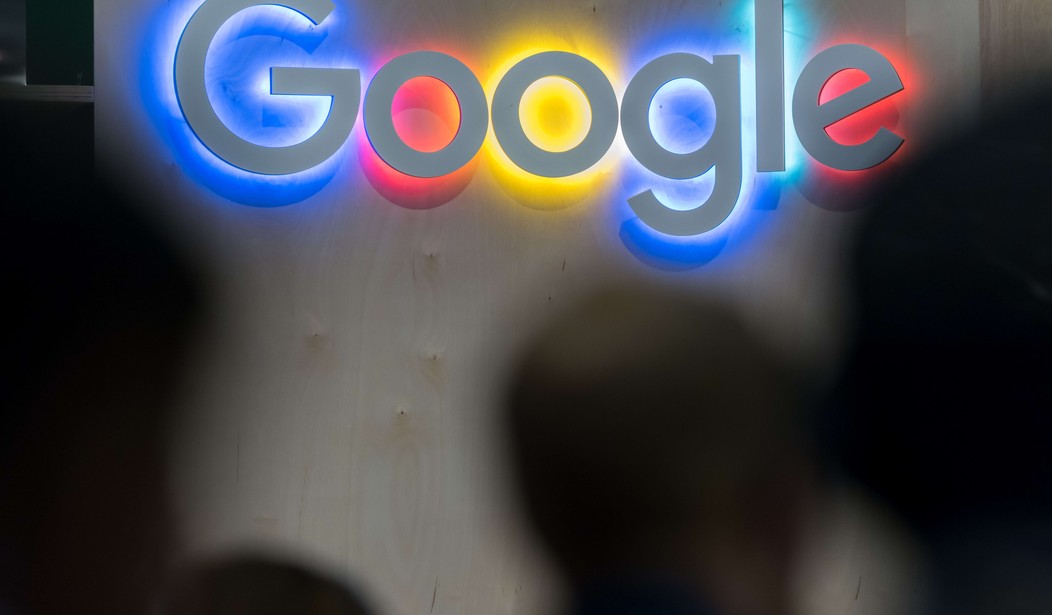On Tuesday morning, President Donald Trump tweeted the results of a PJ Media investigation into Google News results about bias on Alphabet’s search engine giant. Mainstream media outlets attacked Trump’s suggestion as a “conspiracy theory,” but there is reason to think tech giants like Google, Facebook, and Amazon are biased against conservatives.
“Google search results for ‘Trump News’ shows only the viewing/reporting of Fake New Media,” the president tweeted. “In other words, they have it RIGGED, for me & others, so that almost all stories & news is BAD. Fake CNN is prominent. Republican/Conservative & Fair Media is shut out. Illegal? 96% of results on “Trump News” are from National Left-Wing Media, very dangerous.”
Google search results for “Trump News” shows only the viewing/reporting of Fake News Media. In other words, they have it RIGGED, for me & others, so that almost all stories & news is BAD. Fake CNN is prominent. Republican/Conservative & Fair Media is shut out. Illegal? 96% of….
— Donald J. Trump (@realDonaldTrump) August 28, 2018
Trump concluded ominously, charging that “Google & others are suppressing voices of Conservatives and hiding information and news that is good. They are controlling what we can & cannot see. This is a very serious situation-will be addressed!”
….results on “Trump News” are from National Left-Wing Media, very dangerous. Google & others are suppressing voices of Conservatives and hiding information and news that is good. They are controlling what we can & cannot see. This is a very serious situation-will be addressed!
— Donald J. Trump (@realDonaldTrump) August 28, 2018
That 96 percent figure came directly from PJ Media’s supervising editor, Paula Bolyard. Using different laptops, she performed multiple Google News searches for the word “Trump,” and found pervasive bias in favor of left-leaning news outlets. She also noted that PJ Media’s Google traffic decreased after a May 2017 Google algorithm change, and has not recovered.
While Bolyard admitted her study was far from scientific, she also cited a far more in-depth study performed by SEO company “Can I Rank,” which found “that top search results were almost 40% more likely to contain pages with a ‘Left’ or ‘Far Left’ slant the they were pages from the right.” Tellingly, the study found that “16% of political keywords contained no right-leaning pages at all within the first page of results.”
“Google does not manipulate results,” Maggie Shiels, a public affairs representative at the company, told PJ Media. Bolyard also noted, however, that Bloomberg columnist Leonid Bershidsky wrote about the problem of bias earlier this year, noting that “Google’s search algorithms are a black box to the public.”
Unlike Trump, Bolyard never called for government regulation, and she expressed exasperation that the president would cite her article to suggest Google is involved in illegal activity.
https://twitter.com/pbolyard/status/1034413838282772481
Many media outlets attacked Trump’s tweets as promoting a conspiracy theory, with CNN perhaps most prominent among them.
CNN’s senior media reporter, Oliver Darcy, tweeted an immediate response to Trump’s tweets, citing a line from a story he wrote last week attacking an earlier Trump tweet on conservative censorship on social media.
“Evergreen line from my story last week: ‘With his tweet…Trump has signaled that he and his Republican allies would continue to paint tech giants like Facebook and Twitter as villains in a longstanding culture war used to excite the conservative base,'” Darcy tweeted.
Evergreen line from my story last week: “With his tweet…Trump has signaled that he and his Republican allies would continue to paint tech giants like Facebook and Twitter as villains in a longstanding culture war used to excite the conservative base.” https://t.co/iAKwBt2tdd https://t.co/1QKeFKNPRJ
— Oliver Darcy (@oliverdarcy) August 28, 2018
CNN’s Chris Cillizza set about “debunking Donald Trump’s latest conspiracy theory on Google.”
In order to categorize media outlets, Bolyard cited Sharyl Attkisson’s media bias chart. Cillizza attacked the chart as effectively conspiratorial.
“Every major mainstream media outlet in the country — from CNN to The New York Times to the Washington Post to Bloomberg is cast as left-leaning,” Cillizza complained about Attkisson’s chart. “Infowars, Alex Jones’ conspiracy website, is placed in the center-right.” Cillizza dismisses this categorization, saying, “if you believe that InfoWars has the same editorial processes to get something published as The Washington Post, I can guarantee you that you are wrong.”
Cillizza was, of course, correct that InfoWars has a lower standard than The Washington Post. Attkisson never claimed anything different. InfoWars is a conspiracy website, but its bias is not necessarily hard-right. Similarly, The New York Times, CNN, and The Washington Post are both more professional and more left-leaning, on a whole host of issues.
The CNN analyst went on to note that Bolyard laid out how Google’s algorithm works. PJ Media’s supervising editor noted that there are around 200 factors Google uses to rank pages, and that “a whole science has developed — called search engine optimization (SEO) — that purports to help sites become more visible in Google search results.”
Cillizza cunningly added something Bolyard never stated, however. “Bolyard herself makes clear how Google’s search engine works — and how that has zero to do with a publication’s ideology,” he asserted.
Bolyard never claimed that Google’s algorithm has nothing to do with a publication’s ideology. She never claimed to know, one way or another. She did note, however, that “Google is constantly tweaking their algorithm, and a website’s traffic prospects can rise or fall depending on the changes.” One specific algorithm change — in May 2017 — resulted in a severe drop in PJ Media’s Google traffic, and other conservative sites reported similar decreases.
“What Bolyard is suggesting is that because we don’t know the algorithm that Google uses to populate its ‘News’ tab, it’s possible that they could be purposely editing out conservative sites,” Cillizza noted. “Because we can’t rule it out, then no one can say what she’s suggesting isn’t true.”
Cillizza’s “debunking” did not prove that Google’s algorithm has no ideological bias. He merely attacked the suggestion as a conspiracy theory. “This is the essence of all conspiracy theories: You can’t prove beyond a shadow of a doubt that I am wrong, so I just might be right!”
That is not what Bolyard was claiming. She raised the question of whether or not Google’s algorithm is biased — she did not definitively answer it. She also cited other studies that suggested a bias.
Tellingly, the CNN analyst seized on Bolyard’s admission that her study was “not scientific” as some sort of red flag — even though Bolyard also cited other more scientific studies that came to her conclusion.
Worse, Cillizza and Oliver Darcy ignored the long trail of evidence suggesting systemic anti-conservative bias from tech companies like Google, Facebook, Twitter, and Amazon.
Last week, Facebook took down posts sharing mainstream conservative articles (from a CNN contributor and bestselling author, Salena Zito, and from a Washington Examiner contributor, Jenna Lynn Ellis), saying these posts “look like spam.”
Shortly after this, the president tweeted, “Social Media Giants are silencing millions of people. Can’t do this even if it means we must continue to hear Fake News like CNN, whose ratings have suffered gravely. People have to figure out what is real, and what is not, without censorship!”
Social Media Giants are silencing millions of people. Can’t do this even if it means we must continue to hear Fake News like CNN, whose ratings have suffered gravely. People have to figure out what is real, and what is not, without censorship!
— Donald J. Trump (@realDonaldTrump) August 24, 2018
CNN’s Oliver Darcy was responding to this tweet in his article attacking Trump for painting “tech giants like Facebook and Twitter as villains in a longstanding culture war used to excite the conservative base.” Tellingly, his article did not once mention Facebook silencing conservative articles based on the premise they “look like spam,” which took place the day before Trump’s tweet.
CNN rushed to “debunk” the claims of Google’s bias against conservatives, without mentioning the many lawsuits against Google! James Damore, the former senior software engineer who was fired after spreading a document asking questions about the tech gender gap, is suing Google for discrimination against conservatives. Prager University is suing Google and YouTube for discrimination against conservative content. YouTube continues to restrict access to PragerU videos.
Facebook recently “shadow banned” PragerU, preventing at least nine PragerU Facebook posts from reaching any of their 3 million followers. For good measure, Facebook also deleted some of their videos.
A survey early this year found that conservative employees in Silicon Valley tech companies live in fear that their political beliefs would be found out. James Damore said conservatives at Google are “in the closet” and that Google executives are digging through a secret mailing list in order to out them.
Tech companies like Facebook, Google, Amazon, and Twitter have relied on the Southern Poverty Law Center (SPLC), a far-left smear factory that brands conservative and Christian organizations “hate groups,” listing them along with the Ku Klux Klan. In June, the SPLC had to pay $3.375 million to settle a defamation lawsuit against a Muslim reformer. About 60 organizations are considering separate defamation lawsuits against the group.
Amazon.com has excluded SPLC-designated “hate groups” from its charity program, Amazon Smile. The company exiled D. James Kennedy Ministries and Alliance Defending Freedom (ADF), a Christian legal nonprofit that has won 9 Supreme Court cases in seven years. D. James Kennedy Ministries is suing Amazon and the SPLC over this action.
More recently, the SPLC-designated “hate group” Jihad Watch and its founder Robert Spencer were de-platformed by Patreon, and then the crowdfunding site GoFundMe effectively stole thousands from Spencer.
Oftentimes, social media companies like Facebook and Twitter will temporarily ban conservatives for “hate speech,” when the posts in question did not violate their safety standards. Christian scholar Robert Gagnon has been repeatedly suspended on Facebook, and in April the social media platform suspended a German history professor for saying that “Islam is not a part of German history.”
Like the SPLC’s “hate group” labels, these “hate speech” bans target conservatives, not liberals. Twitter CEO Jack Dorsey has “fully” admitted that “our bias is more left-leaning.” Is it really that much of a conspiracy theory — considering the lawsuits, the partnership with the SPLC, and the many isolated instances of conservatives finding themselves singled out — to suggest that tech companies have systematically targeted conservatives?
All this context and more gives important weight to Trump’s claims that Google is biased against conservatives. Rather than address the mainstream conservatives attacked in these isolated incidents, however, mainstream media reporters continue to cite the bans on InfoWars as if they were the main issue.
Cunningly, Darcy ignored the de-platforming of Jihad Watch and the silencing of conservative articles as “spam.” He wrote, “It was unclear what precisely the President’s Friday tweet was referencing, but it came just weeks after Facebook, YouTube, and Apple removed content from far-right conspiracy theorist Alex Jones and his fringe media organization InfoWars from their platforms.”
Neither Trump’s tweet last week nor his tweets Tuesday morning were about InfoWars. By mentioning InfoWars, however, Darcy associated the “conspiracy theory” of tech anti-conservative bias with a truly conspiratorial website.
PragerU, James Damore, Salena Zito, Jihad Watch, D. James Kennedy Ministries, and Alliance Defending Freedom are not InfoWars. Their experiences are real, and pending litigation against Google cannot be ignored in the discussion of whether or not Trump’s tweets support a “conspiracy theory.”
Finally, Paula Bolyard never insisted that her article proves Google’s bias, and she never called for federal intervention into tech companies. Bolyard’s article raised important questions that cannot be “debunked” as a “conspiracy theory.”









Join the conversation as a VIP Member